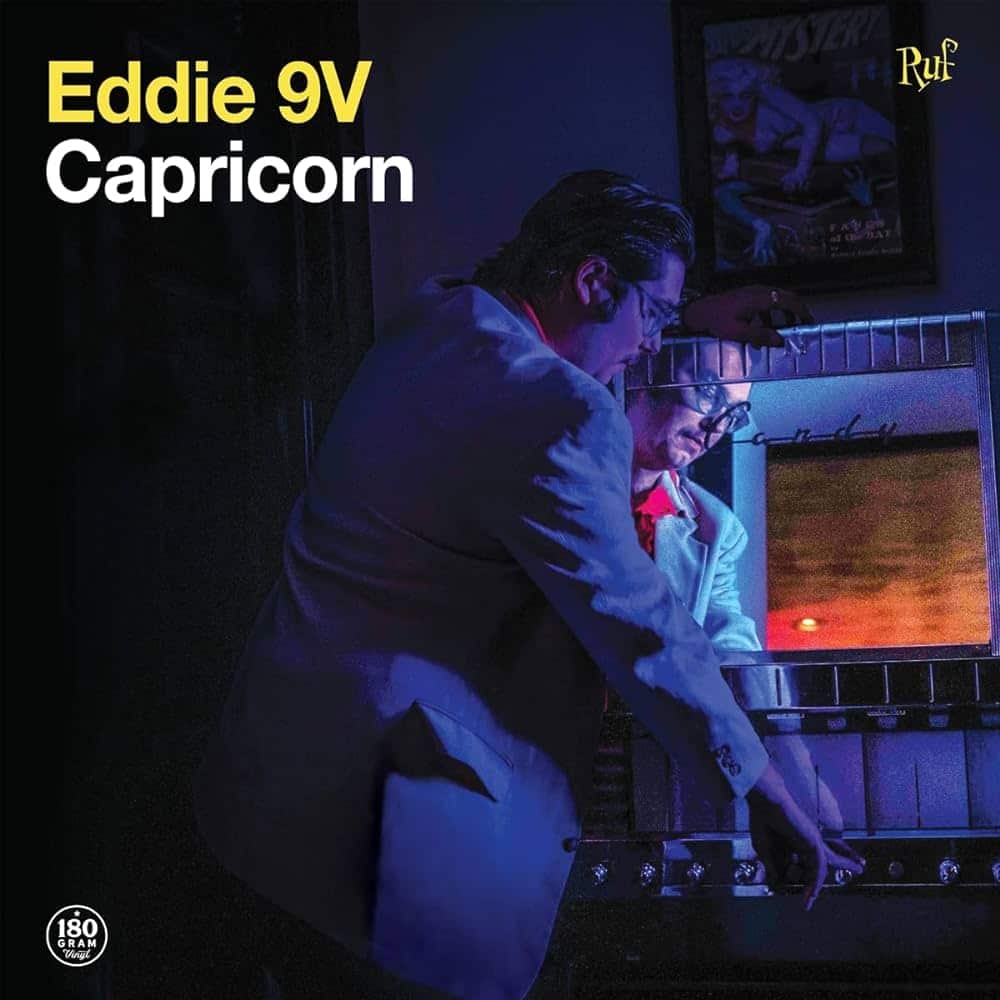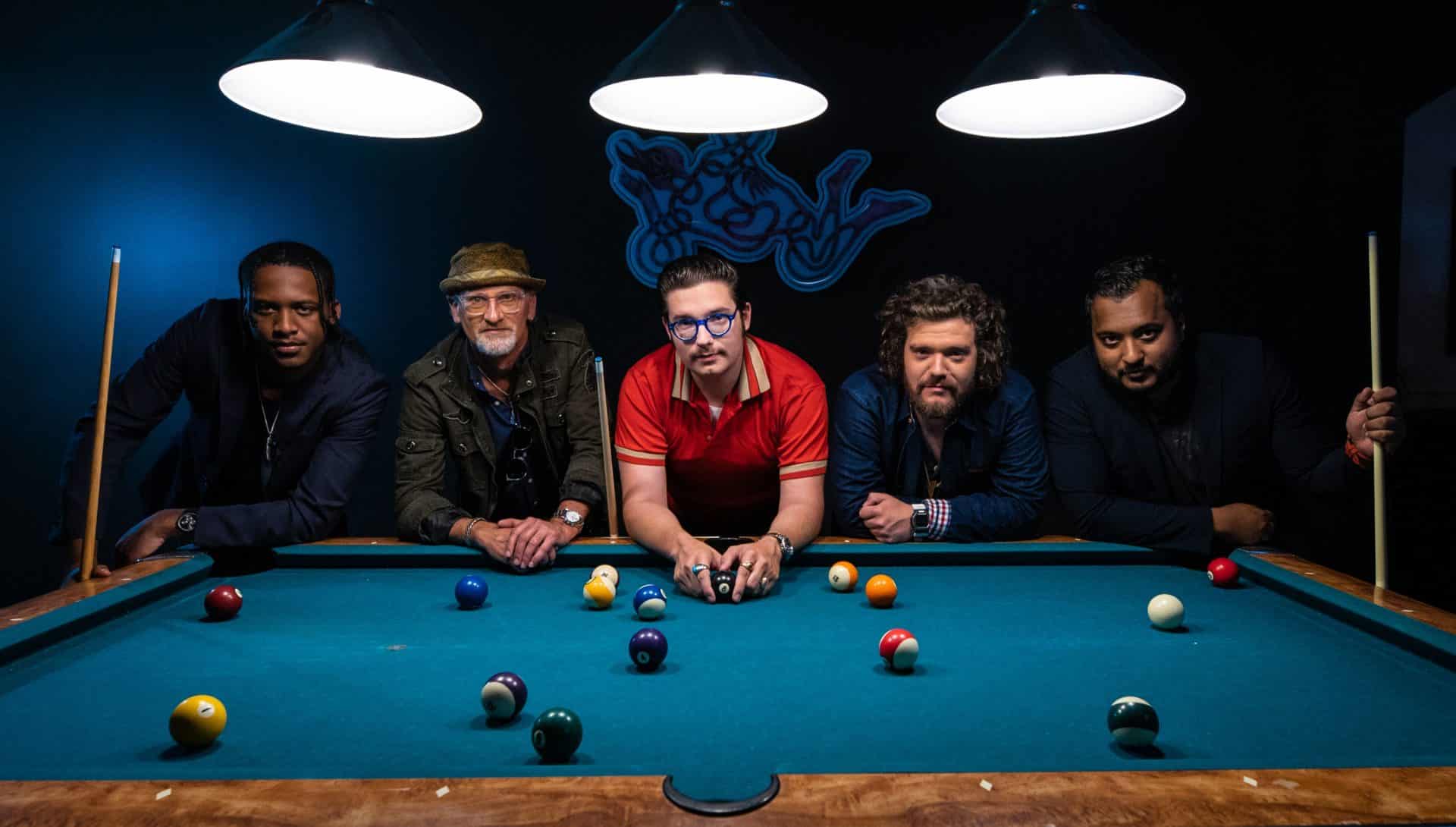“I don’t believe in ‘Boo!’ ghosts, but as soon as went into the door into the control room going out to the studio, it was like literally walking through a film of history. I was coated in it. I could feel the spirits. I don’t believe in ghosts, but I could feel the energy that’s been crazy in the rooms,” says Eddie 9V, describing his first visit to Macon’s famed Capricorn Studios as he prepared to record his latest album, the aptly titled Capricorn.
It’s been whirlwind heat for Eddie 9V since I last spoke to him in the summer of 2021 about his breakthrough sophomore record, Little Black Flies. The album solidified his reputation as one of Atlanta’s premier bluesmen, but he long ago set his sights beyond provincial success. “We started out in the beginning of 2022, playing small clubs around Atlanta,” he says, “We went to headlining the Variety Playhouse and then playing the Telluride Blues Fest and the San Diego Blues Fest. And now we’re on two cruises and about to play the Fillmore later this year.”
With larger audiences and venues came the inevitable desire to push his music beyond the boundaries of traditional blues. Over the past years, Eddie’s fallen in love with the deep soul music of America’s south, and Capricorn is his love letter to the form. As with most American music, the blues influence is within arm’s reach, but Eddie’s found a sound that melds the blues with funk, amplified gospel, and yearning R&B. He says, “I listen to a bunch of soul music; I listen to music at least for like two hours a day. I listen to music in the morning when I wake up; I listen to it when I go to bed, so I’m just pulling from different ideas I have from a bank of inspiration usually at all times, man. Leading up to this album, I listened to basically nonstop Memphis soul for half a year, Al Green, Syl Johnson, or O.V. Wright,” For instance, discussing the origins of Capricorn’s “Are We Through”, an all-tore-up weeper, he confesses his inspirations: “That tune was me on drums, me on bass, my brother on Wurlitzer. He just came up with that riff, and I just thought to myself, “What would Al Green do?”
Eddie and his band recorded Little Black Flies in a doublewide trailer in Monticello, a decadent session that produced a greasy album full of tipsy improvisation, complete with clanking beer bottles and studio chatter. But with Capricorn, Eddie understood the experience required more reverence and focus: “I knew that I wasn’t gonna make a career of getting hammered and making blues records. You can do that once, and it’s good, and I’m glad we did it, but for this record at Capricorn, I knew that if we were gonna go to a legendary studio like that, I wanted to put my all in the songwriting and getting the right band in there. Realistically, we had a few tunes already written since Little Black Flies, so a lot of these tunes are pretty old. We wrote them and demoed them out at our home studio. Then we went to Capricorn with the band, and we rehearsed. It was a much different process than Little Black Flies. With the new record, we were paying attention more and being a little bit more focused, but don’t get me wrong– we were still drinking and eating pizza, the old formula with Little Black Flies, just in Capricorn.”
The decision to experiment with more soul-inflected instrumentation was a given. Eddie says, “I knew that I wasn’t just making another straight-ahead blues album. With my other records, I knew exactly going in what was gonna happen: We were gonna have a good bit of drinks, have some food, the band smoking on whatever. I knew that we were going to make an old traditional-style blues record, but with this one, thinking about our mindset, I told the band, ‘Ok, look we know these tunes that we’ve rehearsed, but just imagine a 1969 or 1971 mindset of going into an old studio.’ The good thing about Capricorn is that it looks exactly the same since it was built. Maybe there’s a few new pieces of gear, but I told them, ‘Just imagine that you’re back in the day. I don’t want any cellphones on.’ We did about everything as we could as close as back in the day except smoke cigarettes. Recording in a sacred space like Capricorn makes the creative process a lot easier. Don’t get me wrong, whether it’s recording in the doublewide or at my dad’s house, inspiration is where you find it, but definitely, it helps when you’re in a place that has provided successful results.”
Despite the hallowed ground, the band still managed to have fun, Eddie maintaining the cool of his studio band, which included his brother Lane Kelly (bass), Chad Mason (keys), Noah Sills (alto sax), Aaron Hambrick (drums), Cody Matlock (guitar), Dustin McCook (guitar), Tony Eric (percussion), Spencer Pope (organ), Danie Wytanis (trombone), and Justin Golding (baritone sax). “It’s leading an army or a squad,” says Eddie, “It’s one thing when you’re recording in a home studio, but when they get into a nice studio, everybody gets cold feet, and it’s hard to pull a performance out of them. The goal is to make everyone feel relaxed and have fun. That’s why I always bring a party environment. No one wants to hear a stale record that someone’s scared on, but that’s why I picked all the right people that I knew who weren’t gonna get cold feet. They knew exactly what I wanted do. They know on an Eddie 9V record they can kinda fuck up and mess up, and we’ll probably still end up putting them on the record.”

The result is a Dear John to Eddie’s days as a blues-based gunslinger and modern-day embrace of all things Stax, Hi Records, Capricorn, and Muscle Shoals. Lead track “Beg, Borrow and Steal” and “How Long” are dance floor movers, animated with ache and gusto; “It’s Going Down” approaches psychedelia with its baroque use of woodwinds; “Mary Don’t You Weep” delivers the holiest of secular baptism; and “Yella Alligator” finds groove in the gumbo.
Capricorn also includes Eddie’s version of “Bout to Make Me Leave Home”, a Syl Johnson and Bonnie Raitt staple. He says, “We were traveling down to Florida one day, and I heard that song on Spotify by Syl Johnson, and it blew me away. Chad, our keyboard player, said that Bonnie Raitt did it too. I listened to it, and I recorded her version with her arrangement and lyrics. By accident, I totally slipped up and said, ‘I’ve never met a man like you,’ which I thought, in the end, was funny, so I said, ‘Just leave it.’
He also covers Bob Dylan’s “Down Along The Cove”. “I’m a big early Dylan fan,” says Eddie, “I really stop at Blood on the Tracks, but I love his stuff. Johnny Jenkins recorded that tune in ‘70 at Capricorn. It felt like we were catching the same vibrations from then when we were recording. It was pretty crazy.”
As for Capricorn’s reception, the notoriously single-minded blues purists have celebrated Eddie’s soulful evolution. He admits, “I was worried about that as soon as we got done with the record because there’s only one blues song, and the rest is Southern soul. But honestly, it’s been great. Everybody, even all the blues publications, and the blues people, they haven’t even said anything about us moving in a different direction. They just say, ‘Hey, this soul album is pretty damn good.’”
Capricorn is available now from Ruf Records or through your favorite digital platform.
Charlie Farmer is a Georgia writer and professor who loves his wife, his daughters, his students, his cats, his books, his LPs, and everything else one should love in life.
